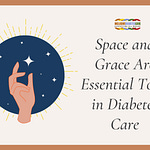Recorded: Tue, Oct 24, 2023, 12:00 PM - 01:00 PM EDT
Course description
While the future of diabetes is inclusive, deciding how to talk with your team, referring providers, or administration isn’t always easy. So, how can you get everyone on board and offer care to higher-weight individuals? This course will help you discuss the concept of stigma in diabetes care with your peers and colleagues.
Learning objective: Participants will be
List seven stigmas that impact people with diabetes
State two examples of how stigma affects the Social Determinants of Health for people with diabetes
Participate in a role-play to talk with peers regarding the impact of stigma in diabetes care.
This 1 hour CPE Program will help you
Understanding seven types of stigmas.
Deepen your understanding of Weight Stigma in diabetes care often intersects with other forms of stigma.
Communicate how all forms of stigma result in a cycle of self-harm.
Explain how the stigma associated with diabetes reinforces other oppressive narratives.
Citations
American Diabetes Association. Economic costs of diabetes in the US in 2017. Diabetes Care. 2018;41:917–928.
Williams DR, Lawrence JA, Davis BA, Vu C. Understanding how discrimination can affect health. Health Serv Res. 2019 Dec;54 Suppl 2(Suppl 2):1374-1388. Doi: 10.1111/1475-6773.13222. Epub 2019 Oct 29. PMID: 31663121; PMCID: PMC6864381.
Rebecca M. Puhl, Mary S. Himmelstein, Jane Speight; Weight Stigma and Diabetes Stigma: Implications for Weight-Related Health Behaviors in Adults With Type 2 Diabetes. Clin Diabetes 1 January 2022; 40 (1): 51–61. https://doi.org/10.2337/cd20-0071
This is a level 3 activity
Target Audience:
Dietitians, Diet Technicians
Health and Fitness professionals
Community Health Workers
Social Workers
Case Managers
Health Coaches
Instructor: Megrette Fletcher M.Ed., RDN, CDCES, with no conflicts of interest to disclose
1-10 minutes: What is stigma? What does it sound like? Exploring seven types of stigma.
11-20 minutes: References that describe the impact of stigma on research
21-30 minutes: Compassionate ways to respond to stigma in diabetes
31-49 minutes: Case study: Marianne and Sade
50-55 minutes: Review of helpful research and websites
55-60 minutes: Q&A
Here are the additional links mentioned in the video
The video talked about HIPP, which stands for
Historical racism/oppression/stigma
Institutional racism/oppression/stigma
Persistent-Institutional racism/oppression/stigma
Personal racism/oppression/stigma
It is from the book My Grandmother's Hands. Here is the ERE (Education for Racial Equity) training link
Mentioned but not discussed:
After the session, ask, "What would increase your comfort level to reach back to me if a question came up?"













Share this post